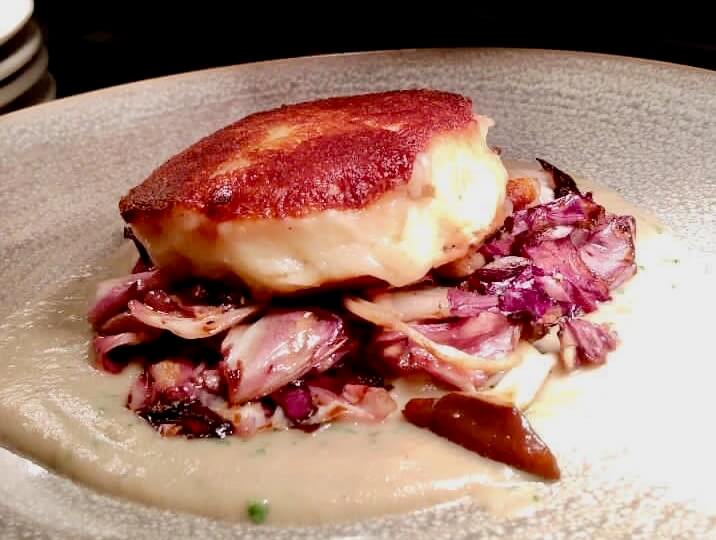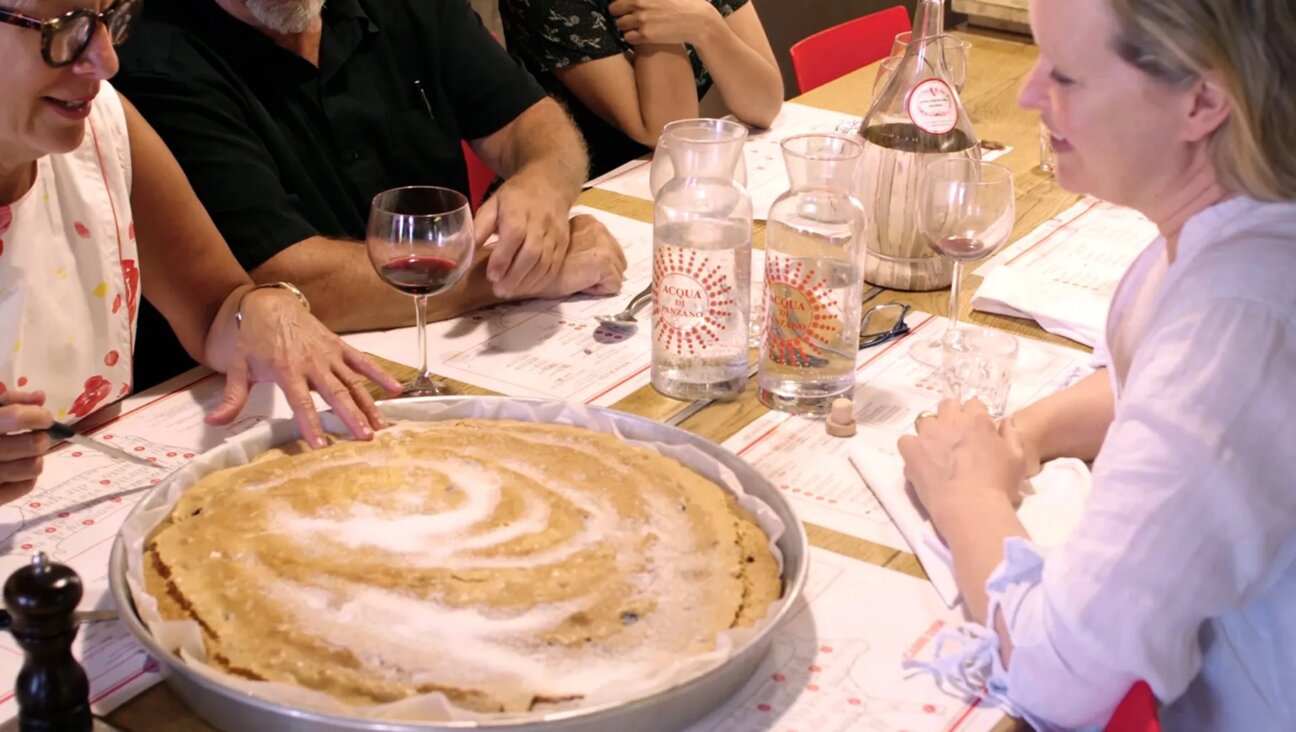Roast Chicken and Corn in Jigs’ Sukkah

Image by istockphoto
When I was growing up in the 1950s, none of my friends had a sukkah in the backyard and I do not recall one at our synagogue.
In fact, I do not recall a single thing about the holiday of Sukkot from my childhood. Like many families of my generation with a token association to Judaism, we kept kosher, observed Passover and went to the synagogue on the High Holidays, sometimes on Friday night (my parents), never on a Saturday morning unless it was to attend a Bar Mitzvah (a Bat Mitzvah was unheard of). Hanukah was not the big deal it is today. Sukkot passed by without a mention.
But during the years of my Jewish self-education on a back-country farm, Sukkot, also called the Feast of the Ingathering, had a special meaning for me, linking my own activities on the land to my forbears in the ancient land of Israel. I felt the desire to sit in a sukkah.
And so it was that one fall morning, in the midst of our busy harvest, I expressed my desire to Jigs. (You may recall him as the self-described WASP of .)
“You want a sukkah? he asked. “You shall have one!” he declared. “What does it look like?”
“A sort of booth,” I answered, “like the Israelites lived in in the desert before they reached the Promised Land. A three-sided, bough-covered hut, open enough at the top to see the stars.”
“Leave it to me,” Jigs said, and off he went to his various fall chores, having added another to his long list, while I plunged into the work at hand for a typical early autumn day on Cape Breton Island, warm and intermittently rainy. I gathered ripe elderberries and early apples for jelly, picked up the fallen dark red crabapples for preserves, canned a batch of mackerel from the smokehouse, turned clabbered milk into curds, made the week’s bread. Our fall life was all about ingathering.
While I worked at my jobs, I could see Jigs in the barnyard cutting up the pile of slab wood he’d hauled with the team of horses from the sawmill four miles down the road. By late afternoon, I noted that some of the slabs had been hauled to the side of the garden shed, adjacent to a new strawberry bed, the area where we also grew corn, beans, potatoes, cabbage and carrots. I sought the new form on the landscape. Sprays of rose hips entwined its doorway, branches of maple and willow (one of the Four Species) gently waved from its roof and cornstalks from the garden lay against its outer walls. Jigs’ sukkah was taking shape.
The day before the start of Sukkot was sunny, and Jigs’ work continued: hauling the cut-up slab wood to the log cabins we rented to summer guests, and repairing the barn for the animals who would soon be brought in from their pastures, now eaten down like a lawn. Sometime during the day I noticed that furnishings had been provided for the sukkah, a wooden trestle table and a bench.
“It’s yours now,” Jigs said and we went to the barn to milk the cows.
That evening a neighbor, a retired farmer, turned up with a small truckload of freshly cut clover, a second cutting from his rich, now unused field. “I just brought a little over to see if you wanted it,” he said. “There’s a bigger truckload if it’s any use to you.”
Such a gift in the fall of the year, when our cattle would have to start eating its winter supply of hay a month ahead of schedule because of poor pasture regrowth, was more than welcome. Of course we wanted the clover, but the time to get it would have to be late the following afternoon, the eve of Sukkot, when a truck was available. There was no time to lose as rain was predicted, in which case the clover would be ruined.
“I’ll come get you around five,” our friend said to Jigs, as visions of sitting in the sukkah faded away with what I call the “moving the refrigerator on Yom Kippur syndrome,” the gentile world’s inadvertent indifference to Jewish time (an indifference I shared until recently).
“We’ll eat in the sukkah,” Jigs said as he left the next afternoon to help load the clover, but not before he had cooked his specialty, a main course of barbecued chicken and lots of corn roasted over the outdoor fire’s glowing coals. This would be a Sukkot meal with an American flavor.
I did the chores alone, took the food from the fire, assembled everything, including wine, challah, candles and our seven-branched menorah for light (a replica of the Temple one, which a friend had brought back from Jerusalem), and loaded everything into two baskets.
As soon as Jigs was home and the clover was heaped on the barn floor, we gathered up our meal, entered the hut and prepared the table. It was dark now, with a brisk wind blowing from the northwest. There would be no candles tonight … quick run to the house for an oil lamp! Such are the anomalies of celebrating the desert wanderings on a north-country farm in the fall.
The blessings said, the delicious meal ensued, attracting the notice of uninvited guests who, in addition to the traditional Abraham, Isaac and Jacob, included our retriever Dusty and two small cats, one of whom was the son of our only Hebrew feline, Tapoozah.
The flame in the lamp chimney flickered, the unlit menorah’s shadow fluttered on the slatted wall in front of us and the now-bare cobs piled up as the wind blew and drops of rain began to fall. No stars to look at through the roof tonight, but we had eaten in the sukkah. We had, after a fashion, performed the mitzvah to remember, “You shall dwell in sukkot [huts] … in order that future generations may know that I made the children of Israel to dwell in sukkot when I brought them out of the land of Egypt” (Leviticus 23:42-43).
We ate once more in the sukkah, in between the rains, on Hoshanah Rabbah. And later, after Sukkot, when we continued to harvest the garden, pulling the beans, cutting the remaining cornstalks to feed to the cows and digging the potatoes, we were aware of the little hut nearby, where the sun now filtered through its roof, the outer wall casting its shadow against the shed, the table and bench just visible within.
No need to take it down yet, there would be plenty of time for that.
So what did it mean to sit in a sukkah? The earth, after all, didn’t move, did it? (Neither did it move when I forgot to remember all the mitzvot of Jewish life for so many years.)
Yet, unmistakably, another step had been taken, a renewing of an old bond, transforming, enfolding our farm, our life, and however briefly, giving them a meaning beyond themselves.
Jigs’ Chicken Dinner in the Spirit of Sukkot
Jigs prepares this meal on a simple open fire built inside an old tire rim with a grate placed on top. You can use any sort of outdoor campfire or fireplace, or even your kitchen oven, although the flavor imparted from an open fire is hard to reproduce indoors. Here’s how Jigs goes about cooking ours after he’s built his fire and it’s burning well.
Barbecued Chicken With Herb Sauce
For the herb sauce
½ cup olive oil
½ cup lemon juice or vinegar
¼ cup water
2 teaspoons salt
1 tablespoon sugar
1 teaspoon paprika
1 teaspoon each finely minced sage and marjoram
2 pressed or mashed garlic cloves
For the chicken
1 4–5 pound farm-raised chicken, cut into pieces
(Here’s a source of farm-raised chicken wherever you live.)
1) Prepare herb sauce: About an hour before you’ll need it, mix all the ingredients together in a jar, shake well and leave at room temperature to let the flavors meld until ready to use.
2) Lay the chicken pieces on a grate set directly over the flames, turning pieces as needed. Remove the pieces to a roasting pan when they are well browned. Add some larger chunks of wood to the fire, set the roasting pan on the grate, and pour prepared Herb Sauce over the chicken.
3) Add 2 cups of water, then cover the pan and let the chicken simmer for about an hour. Check occasionally to make sure there is still liquid in the pan; add more water as needed. The chicken is done when the thickest pieces are fork tender and the juices run clear when pricked with a knife.
To cook in your kitchen oven:
1) Preheat oven to 400° F and while it is heating, brown chicken pieces well in olive oil in a heavy skillet (cast iron is best).
2) Remove pan from heat, place pieces of browned chicken in a roasting pan, pour over Herb Sauce and 2 cups water, cover, and roast until tender and juices run clear when pricked with a knife (about an hour).
Roasted Corn-on-the-Cob
Fresh corn is still available at local markets, farm stands and farmers markets.
If you plan to roast the corn over an outdoor fire or fireplace: First, soak unshucked ears for about an hour in a bucket of cold water. Shake off excess water; then place the unshucked corn on the same grate as the chicken, turning ears occasionally. The chicken and corn should be done around the same time. To keep the corn warm, wrap each piece in tin foil.
If you plan to roast it in your kitchen oven: While the chicken is cooking in the oven in a roasting pan, rinse unshucked ears in water, shake off excess, then place them next to the chicken and bake for about 30 minutes. Wrap in tin foil to keep warm.
Jo Ann Gardner lives in the Adirondacks where she and her husband maintain a small farm with extensive gardens. Her latest book is “Seeds of Transcendence: Understanding the Hebrew Bible Through Plants.” She blogs for about food for Mother Earth News. She can be reached via her website www.joanngardnerbooks.com

I hope you appreciated this article. Before you go, I’d like to ask you to please support the Forward’s award-winning, nonprofit journalism during this critical time.
Now more than ever, American Jews need independent news they can trust, with reporting driven by truth, not ideology. We serve you, not any ideological agenda.
At a time when other newsrooms are closing or cutting back, the Forward has removed its paywall and invested additional resources to report on the ground from Israel and around the U.S. on the impact of the war, rising antisemitism and the protests on college campuses.
Readers like you make it all possible. Support our work by becoming a Forward Member and connect with our journalism and your community.
Make a gift of any size and become a Forward member today. You’ll support our mission to tell the American Jewish story fully and fairly.
— Rachel Fishman Feddersen, Publisher and CEO
Join our mission to tell the Jewish story fully and fairly.
























